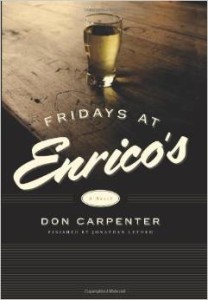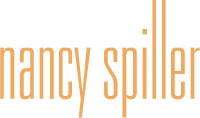July 27, 2014
 Amongst many favorite moments in Don Carpenter’s posthumously published novel Fridays at Enrico’s is when the bartender at Sausalito’s No Name Bar lets the phone ring unanswered on the wall behind him as he concentrates on making a perfect Ramos Fizz for his regular customer, celebrated local novelist Jaime Froward. After setting the drink down ceremoniously in front of her, he picks up the phone. It’s for her and he asks, deferential in the calm, quiet of the bar, whether she would like to take the call.
Amongst many favorite moments in Don Carpenter’s posthumously published novel Fridays at Enrico’s is when the bartender at Sausalito’s No Name Bar lets the phone ring unanswered on the wall behind him as he concentrates on making a perfect Ramos Fizz for his regular customer, celebrated local novelist Jaime Froward. After setting the drink down ceremoniously in front of her, he picks up the phone. It’s for her and he asks, deferential in the calm, quiet of the bar, whether she would like to take the call.
Imagine, please, a calm, quiet, deferential world in which there are no cell phones, answering machines, smart phones, iPads or laptops and an author, without the now required MFA firmly in hand and a caffeine drip stuck in their arm, who doesn’t have to spend every second of their waking life building their brand via Twitter, Facebook, Pinterest, Instagram, Pinging or Ponging, while furiously pounding out another tome on a laptop with their two left feet.
Enrico’s milieu is the sophisticated Paris of the West café society I aspired to as a young writer growing up in the San Francisco Bay Area, which Carpenter has masterfully portrayed in the novel he left behind when he took his own life at age 62 in 1995. All but forgotten now, Carpenter was a literary legend in his native San Francisco Bay Area, from the late ‘50s through the ‘70s, best known for his 1966 prison novel Hard Rain Falling, and screenplay for the 1972 film Payday. Carpenter was also a close friend of the writer Richard Brautigan, who took his own life in 1984. Fridays At Enrico’s is said to be the novel he wrote when he abandoned an effort at writing a biography of his late friend. The manuscript was revived by Counterpoint Press’ Jack Shoemaker and finished by novelist Jonathan Lethem, a Carpenter fan.
With all the talk of suicide surrounding this book, it is a delightful surprise that it is not a sullen, embittered reflection on the disappointments of the writing pursuit it might have been. Instead, Carpenter has left us a loving, generous, lively and thoroughly engaging portrait of what it was like to be an ambitious, determined writer on the West Coast during the book’s period stretching from 1959 to 1975.
It begins at San Francisco State University, where Jaime Froward gets her undergraduate degree, and meets the ten years her senior PhD candidate and Korean war veteran, Charlie Monel, who aspires to write the next From Here to Eternity. Together they move to Portland, where Charlie teaches writing, Jaime raises their daughter, Kira, and Dick Dubonet is the local literary star by virtue of selling a single story to Playboy. People hang out, drink, do drugs, drop the names of San Francisco Beat writers, and write. And when they write, you can hear the sound of actual typewriters clacking and see the carbon copies (!) piling up.
Jaime Froward, whose father was an alcoholic journalist with the Chronicle, so she’s got both literature and booze in her blood, is the first to finish her novel, which she publishes to critical and financial success. Professional jealousies amongst her colleagues, including her husband, ensue. Jaime’s life is that of the quintessential Bohemian San Francisco kid—she hangs out at Tosca’s for cappuccinos with her parents, where opera plays on the jukebox, and loses her virginity in a ratty North Beach apartment. Later, she counts a local prostitute as one of her first round manuscript readers.
With Stan Winger, Carpenter literally embodies the sense of writers as thieves. Winger is a creepy Portland house burglar who studies writing with Monel and finds success after a couple of stints in jail and Hollywood–the one place where his criminal credentials are considered a plus.
Enrico’s writers are also escape artists, transcending the quotidian with their literary creations, yet unable to escape the ultimate loneliness of serious writing, the price they pay for their creative freedom. Carpenter manages beautifully to capture both the hard truths and great highs of that experience, such as the time Jaime gets pulled over for speeding on the Golden Gate Bridge and wonders if the police officer has read her book. What might sound far-fetched in today’s fractured culture would have been a real possibility then.
Still, as Charlie Monel ruefully observes, “There were things to be said in favor of not being published.”
The book, which I was in the thrall of from the get-go, picks up speed towards the end, becoming darker, funnier and more fun, with a final, soft landing that left me wanting more, but grateful for this, Carpenter’s gift to both readers and writers.
The book is so evocative of this particular time and place that half way through I considered the necessity of flying to San Francisco to finish reading it in one of those beloved Tosca booths before walking the streets of North Beach. What stopped me was the sad knowledge that Enrico’s no longer exists. And if it did, it would no doubt be filled with tech baby billionaires in their Google glasses making IPO deals between Tweets, a reality too grim to ponder in light of the far more appealing actual human experience preserved here, when literature and the people who made it were still pre-industrial products.
Now, please excuse while me and my two left feet get back to working on my next book.
